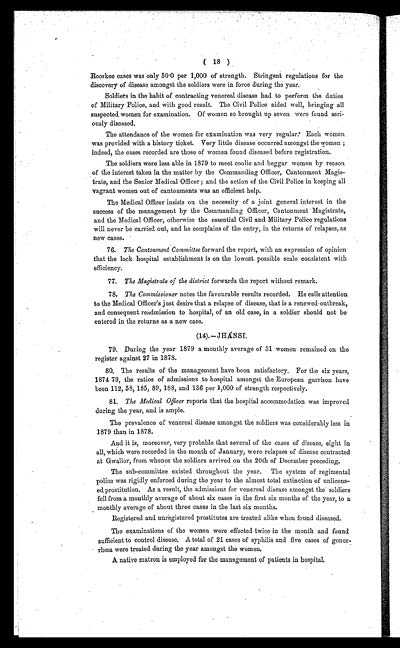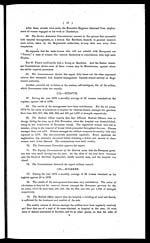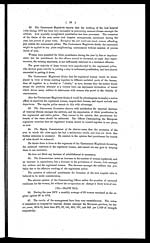Medicine - Institutions > Lock hospitals > Annual report on the working of the lock hospitals in the North-Western Provinces and Oudh > Sixth annual report of the working of the lock hospitals in the North-Western Provinces and Oudh, for the year 1879
(208) Page 18
Download files
Individual page:
Thumbnail gallery: Grid view | List view

( 18 )
Roorkee cases was only 50.0 per 1,000 of strength. Stringent regulations for the
discovery of disease amongst the soldiers were in force during the year.
Soldiers in the habit of contracting venereal disease had to perform the duties
of Military Police, and with good result. The Civil Police aided well, bringing all
suspected women for examination. Of women so brought up seven were found seri-
ously diseased.
The attendance of the women for examination was very regular. Each woman
was provided with a history ticket. Very little disease occurred amongst the women ;
indeed, the cases recorded are those of women found diseased before registration.
The soldiers were less able in 1879 to meet coolie and beggar women by reason
of the interest taken in the matter by the Commanding Officer, Cantonment Magis-
trate, and the Senior Medical Officer ; and the action of the Civil Police in keeping all
vagrant women out of cantonments was an efficient help.
The Medical Officer insists on the necessity of a joint general interest in the
success of the management by the Commanding Officer, Cantonment Magistrate,
and the Medical Officer, otherwise the essential Civil and Military Police regulations
will never be carried out, and he complains of the entry, in the returns of relapses, as
new cases.
76. The Cantonment Committee forward the report, with an expression of opinion
that the lock hospital establishment is on the lowest possible scale consistent with
efficiency.
77. The Magistrate of the district forwards the report without remark.
78. The Commissioner notes the favourable results recorded. He calls attention
to the Medical Officer's just desire that a relapse of disease, that is a renewed outbreak,
and consequent readmission to hospital, of an old case, in a soldier should not be
entered in the returns as a new case.
(14).—JHÁNSI.
79. During the year 1879 a monthly average of 31 women remained on the
register against 27 in 1878.
80. The results of the management have been satisfactory. For the six years,
1874 79, the ratios of admissions to hospital amongst the European garrison have
been 112, 58, 185, 89, 188, and 136 per 1,000 of strength respectively.
81. The Medical Officer reports that the hospital accommodation was improved
during the year, and is ample.
The prevalence of venereal disease amongst the soldiers was considerably less in
1879 than in 1878.
And it is, moreover, very probable that several of the cases of disease, eight in
all, which were recorded in the month of January, were relapses of disease contracted
at Gwalior, from whence the soldiers arrived on the 20th of December preceding.
The sub-committee existed throughout the year. The system of regimental
police was rigidly enforced during the year to the almost total extinction of unlicens-
ed prostitution. As a result, the admissions for venereal disease amongst the soldiers
fell from a monthly average of about six cases in the first six months of the year, to a
monthly average of about three cases in the last six months.
Registered and unregistered prostitutes are treated alike when found diseased.
The examinations of the women were effected twice in the month and found
sufficient to control disease. A total of 21 cases of syphilis and five cases of goner-
rhœa were treated during the year amongst the women.
A native matron is employed for the management of patients in hospital.
Set display mode to: Large image | Zoom image | Transcription
Images and transcriptions on this page, including medium image downloads, may be used under the Creative Commons Attribution 4.0 International Licence unless otherwise stated. ![]()
| Permanent URL | https://digital.nls.uk/75111456 |
|---|




